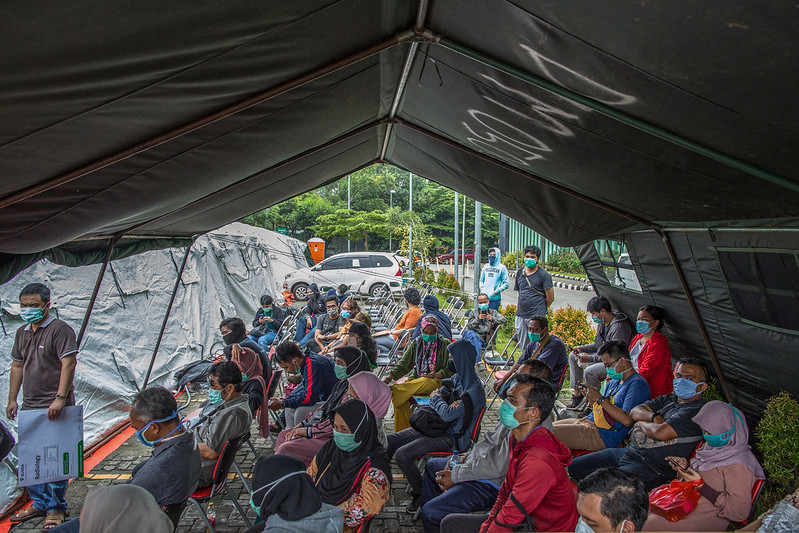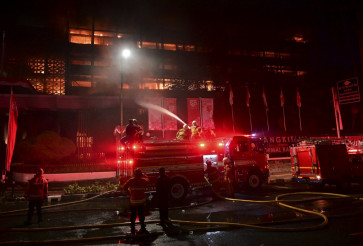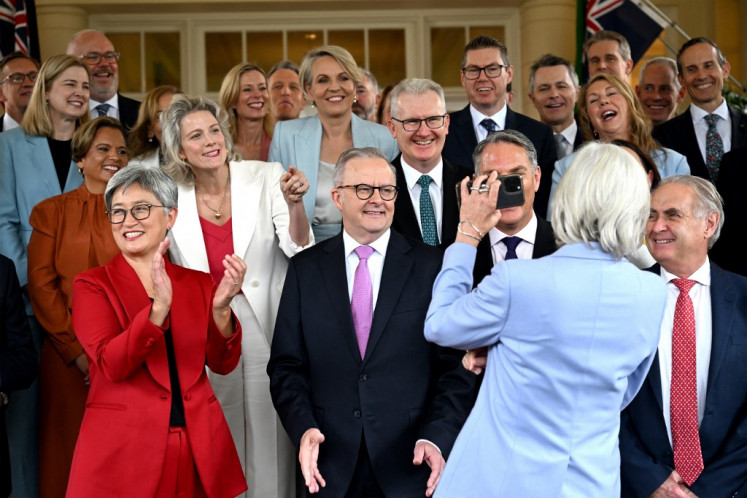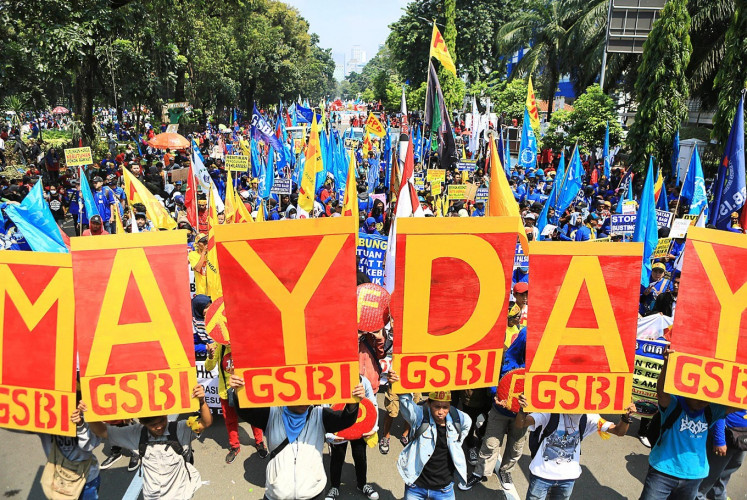Remembering health workers who fell to COVID-19
Medical professionals in short supply, but pandemic indicators in safe zone.
Change text size
Gift Premium Articles
to Anyone

T
hree years since Indonesia found its first confirmed case of COVID-19, thousands of health workers have died in the pandemic, having sacrificed their own lives to save the lives of others. The Jakarta Post remembers a handful of them through the eyes of those who knew them best.
Khoirul Anwar, 30, remembers his late wife, Risma Dwi Anisa, as someone who was caring, altruistic and dedicated to her profession as a blood bank nurse.
Khoirul witnessed first-hand how professional and passionate Risma was at her job, as both of them worked at the Surakarta branch of the Indonesia Red Cross (PMI).
“During the height of the Delta [COVID-19 variant] wave in June 2021, demands for convalescent plasma treatment skyrocketed. She refused to take time off despite being seven months pregnant at that time and being overloaded with work, knowing how understaffed we were and how many patients desperately needed the treatment," Khoirul told the Post in a recent interview.
Convalescent plasma therapy is a transfusion of blood plasma, which makes up the blood’s liquid form, from someone who has recovered from COVID-19 to patients who are still contracting the disease.
It was initially believed that antibodies from the plasma might help people recover from COVID-19, lessen the severity and shorten the length of contraction of the disease, but the World Health Organization (WHO) ended up recommending against the use of the treatment in December 2021 due to the lack of scientific evidence.
Risma eventually contracted COVID-19 in late June 2021, in the midst of the Delta-fueled case surge that devastated hospitals across the country. She was not vaccinated, as the Health Ministry had not recommended COVID-19 vaccines for pregnant women.
Khoirul cared for Risma when she was quarantined in a clinic owned by the Surakarta PMI, but her condition quickly deteriorated.
“She had a fever and had difficulty breathing and it was very difficult to get medication for COVID-19 patients at that time. I desperately tried to transfer her to a hospital but all hospital beds in the city were occupied,” he said.
When Khoirul was able to admit Risma to a hospital a week later, her condition had gone from bad to worse. She went into a coma shortly after and doctors who treated her at the time presented Khoirul with a difficult choice: to save her or their unborn daughter.
Eventually they were unable to save both. Their baby died in the womb on July 11, 2021 and Risma died a day later. She was 25.
Khoirul said he struggled to process his immense grief after their deaths, but he tried his best to move on with his life and choose to remember the best parts of his short marriage.
“We were married for just 11 months but she brought so much joy into my life. She might look stern but she was incredibly caring. She worked hard at her job because she had a really strong desire to help others,” he said.
Doctor Novita Rachmawati was known as someone who was friendly, humble, caring, wise and never hesitant to help others, according to her younger sister, Agus Tina Diana Sari, also a medical professional.
“She easily made friends everywhere she went and she was always eager to help others. Her neighbors even told me that when they were sick, Novita often offered to examine them and gave them free medicine," Agus Tina said.
Novita began to experience COVID-19 symptoms in early December 2020, shortly after she treated a suspected COVID-19 patient at the Intensive Care Unit (ICU) of a private hospital in Ponorogo, East Java, where she worked. She was seven months pregnant with her second child at the time.
“She was not vaccinated as the COVID-19 vaccine was not available back then. It took quite a long time to find out that she contracted COVID-19, as the gold-standard PCR tests were not accessible in all parts of the country at that time,” she told the Post recently.
When Novita was finally admitted to a hospital in Ponorogo for COVID-19, she had developed pneumonia, indicating that the virus had advanced into her lungs. Novita was then transferred to a hospital in Surabaya as her condition continued to deteriorate.
She lost her baby on Dec. 9, 2020 shortly after she was connected to a ventilator. She died on Dec. 11. She was 32.
Agus Tina said Novita's death caused a huge shock and immense sorrow to her family, especially considering how fast her disease progressed.
“We lost her too quickly. My mother and I didn’t even get a chance to see her or speak to her before she was quarantined. To this day, it remains one of our biggest regrets,” she said.
Huge Loss
The Indonesian Medical Association (IDI) revealed earlier this month that 2,172 health workers had lost their lives in the fight against COVID-19.
IDI Secretary General Ulul Albab said the figure comprised 756 doctors, 718 nurses, 421 midwives and other health workers that included pharmacists, nutritionists and physiotherapists.
“We’ll continue to update and verify the data. We’re sure that the real number of fatalities are actually much higher,” Ulul told a press conference on March 9, as reported by state news agency Antara.
The Health Ministry has been conducting various efforts to recuperate from this massive loss of talent as quickly as possible, as the country had been grappling with a serious shortage of healthcare workers even before the pandemic.
The ministry has ordered an increase in quotas at various medical schools across the country, offering scholarships and pushing for hospital-based education for specialists.
Indonesia’s COVID-19 indicators have continued to show signs of improvement since the government lifted its public activity restrictions (PPKM) at the tail end of last year. However, President Joko “Jokowi” Widodo has remained prudent, even ordering a stay on communal break-fast events for public officials throughout Ramadan.
The government is currently consulting with other nations to lobby with the WHO to declare the end of the pandemic.
WHO Director General Tedros Adhanom Ghebreyesus said last week that he was “confident” the COVID-19 pandemic would end this year, as the weekly number of reported deaths is lower in the past four weeks than it was before the pandemic was declared in March 2020.









